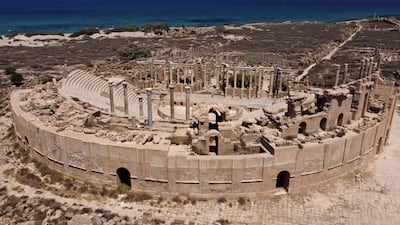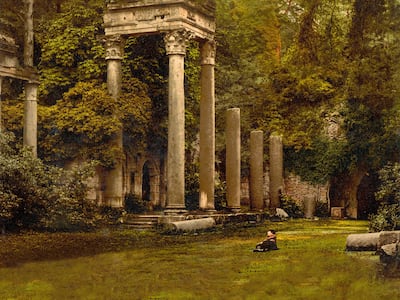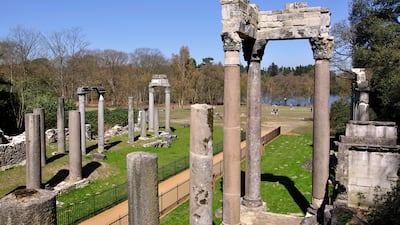The UK has been accused of “unacceptable” delays in failing to respond to Libya’s case for returning Roman artefacts it claims were looted by the British in the 19th century.
The Leptis Magna columns currently sit in land owned by the Crown Estate in Windsor Great Park, just outside London, but originally formed part of an ancient Roman site on the Libyan coast.
The UK says it “understands” they were given as gifts by the ruler of Tripolitania, modern day Libya, to the Prince Regent in 1817 and has so far resisted all calls to hand them back.
Libya says the columns were, in fact, looted and is seeking their return.
The Leptis Magna ruins are a Unesco world heritage site and are named after the Roman city on the shores of the Mediterranean from where they came.
Over the centuries, the city became a quarry for local people, and later a site of colonial plunder for the British and French, whose King Louis XIV took about 600 columns from Leptis Magna to use in his palaces at Versailles and Paris.
Lawyer Mohamed Shaban is acting for Libya and says he first wrote to the Crown Estate, land which belongs to the British monarchy, in October 2021 asking for it to provide documentary evidence that they were in fact given as gifts.
Mr Shaban told The National that his research suggested that “these items were illicitly transferred from Tripolitania to the UK” and this had been “clearly detailed to the Crown Estate”.
He said the last correspondence he received about the matter was a year go.
“While they have acknowledged receipt of my correspondence, they have yet to provide answers to any of my questions,” he said. “I am still awaiting a response, two years later.”
Mr Shaban, the first British-Libyan to qualify as a solicitor of the Supreme Court of England and Wales, said the Crown Estate appeared to be evading having to deal with the matter.
“For them not to respond in that time suggests either they do not have evidence, to counter our position, or they are not taking Libya seriously.
“Either way, their approach so far is unacceptable, especially given that they are an organisation that represents His Majesty.”

Mr Shaban said Libya wanted to engage with the Crown Estate but “they appear not to be giving this important issue the attention that it deserves”.
“I do not know why this is, but one wonders whether they would act in this way if say the United States or the EU had raised a similar issue.
“My clients deserve more respect than they have received, especially as they have afforded the Crown much deference and exercised patience and courtesy.”
Mr Shaban said he's received “many messages from ordinary Libyans expressing their anxiety to have these items returned to their rightful home”.
“These columns belong to the Libyan people. They are part of their history and national identity. Libyans are looking to Britain to correct a historic wrong.”

The story of the Leptis Magna's journey to the UK began when Hanmer Warrington, the British Consul General of Tripoli, apparently become captivated by the sight of the Roman ruins in 1816.
It was the same year that Lord Elgin sold marble sculptures, taken from Parthenon temple at the Acropolis in Athens, to the British government.
Ownership of the Elgin Marbles remains a hotly contested matter between the UK and Greece. Britain is trying to forge a new partnership with Greece that would allow it to loan back the marbles, the chairman of the British Museum, George Osborne, has said.
At the time Tripolitania was part of the Ottoman Empire and run by Yusuf Karamanli, the governor, known by the title Bashaw.
According to the British account, Warrington persuaded Yusuf Karamanli to allow him to remove the stones. It is a claim Libya hotly disputes.
Along with William Henry Smyth, a commander in the Royal Navy, Warrington transported the stonework treasures, which include 22 granite columns, to the UK.
Initially, the stones were deposited with the British Museum but in 1828, they were erected by King George IV’s architect Sir Jeffry Wyatville at Virginia Water in Windsor Great Park.

Supplanted into an artificially constructed Temple of Augustus, the columns are now a Grade II listed property of the Crown Estate.
Mr Shaban has been involved in repatriating looted artefacts from Libya before and hopes an amicable solution can be found to resolve the dispute over the Leptis Magna columns.
After a 2,000-year-old funerary statue of the Greek goddess Persephone was stolen from the ancient city of Cyrene in Libya in 2011 and taken to the UK, Mr Shaban represented the North African country during the legal case to return the artefact.
“This matter is of public interest and I hope that the Crown would start engaging with us constructively to address the outstanding issues,” said the London-based Mr Shaban.
Labour MP
Labour MP Bell Ribeiro-Addy, who chairs a group of UK politicians from all political parties, calling for the reparation of artefacts to Africa, said it was a matter of treating Libya with “respect”.
“In matters such as this we should really consider the impact to our country if people feel we hold on to things that don’t belong to us,” she told The National.
“It’s fair enough to ask for evidence that it was gifted but, ultimately, if there’s evidence that it was looted then there should be consideration about returning such items.
“It’s a different world we live in, there is no more empire, and we can’t hold on to things that don’t belong to us and were effectively looted.
“I don’t think that anybody in good conscience would want anybody else to think that they had stolen goods in their possession, and the thing to do to make sure nobody thinks that is to provide evidence.”

Ms Ribiero-Addy said many countries just wanted “the respect of ownership” and didn’t necessarily seek the return of all artefacts held in the UK.
She cited the example of the Horniman museum in London, which agreed to return six artefacts looted by British troops 125 years ago from Benin City to Nigeria, which, in turn, allowed some others from the collection to remain on display.
“So, it’s not the case that we’ll empty all the museums if the ownership are returned. It’s all about respect.”
The Crown Estate says the columns “continue to be enjoyed by the millions of visitors to Windsor Great Park”.
“Our understanding is that the Leptis Magna columns were gifted to The Prince Regent in 1817 by the Bashaw of Tripoli,” said a representative.
“We have commissioned an historian and an Arabic specialist to undertake research to confirm the status of the columns. Unfortunately, this is slow and painstaking work given how documents were recorded over 200 years ago.”


